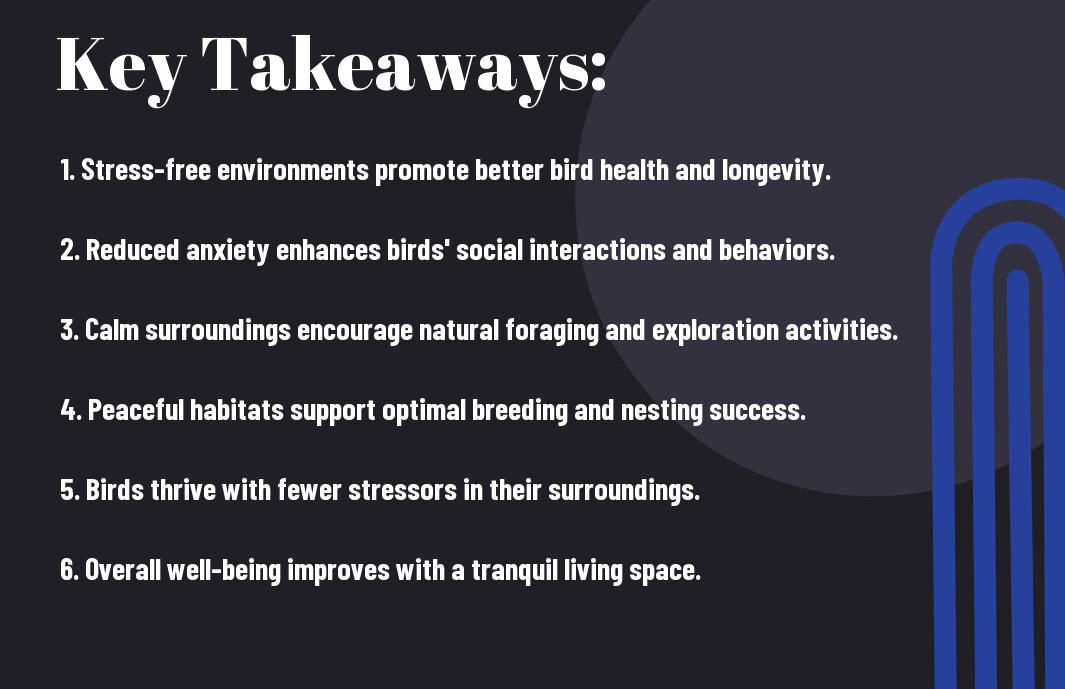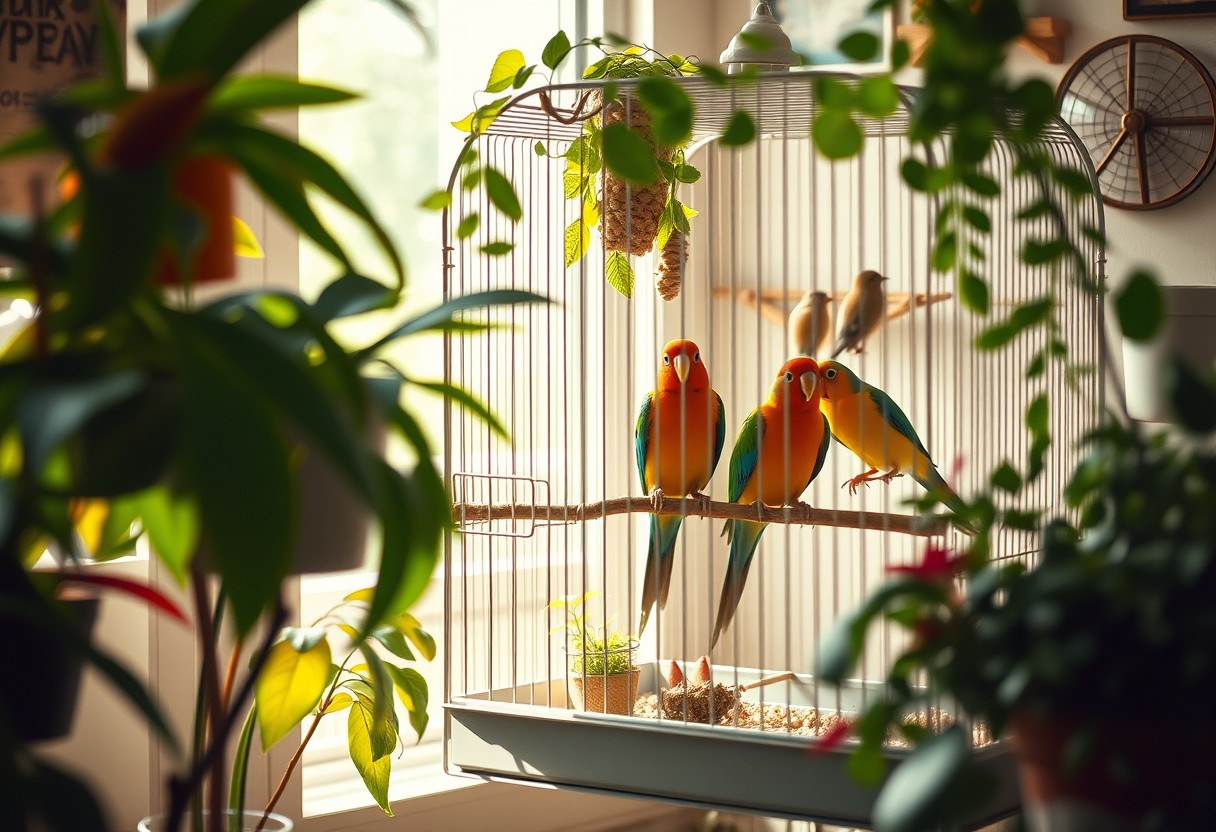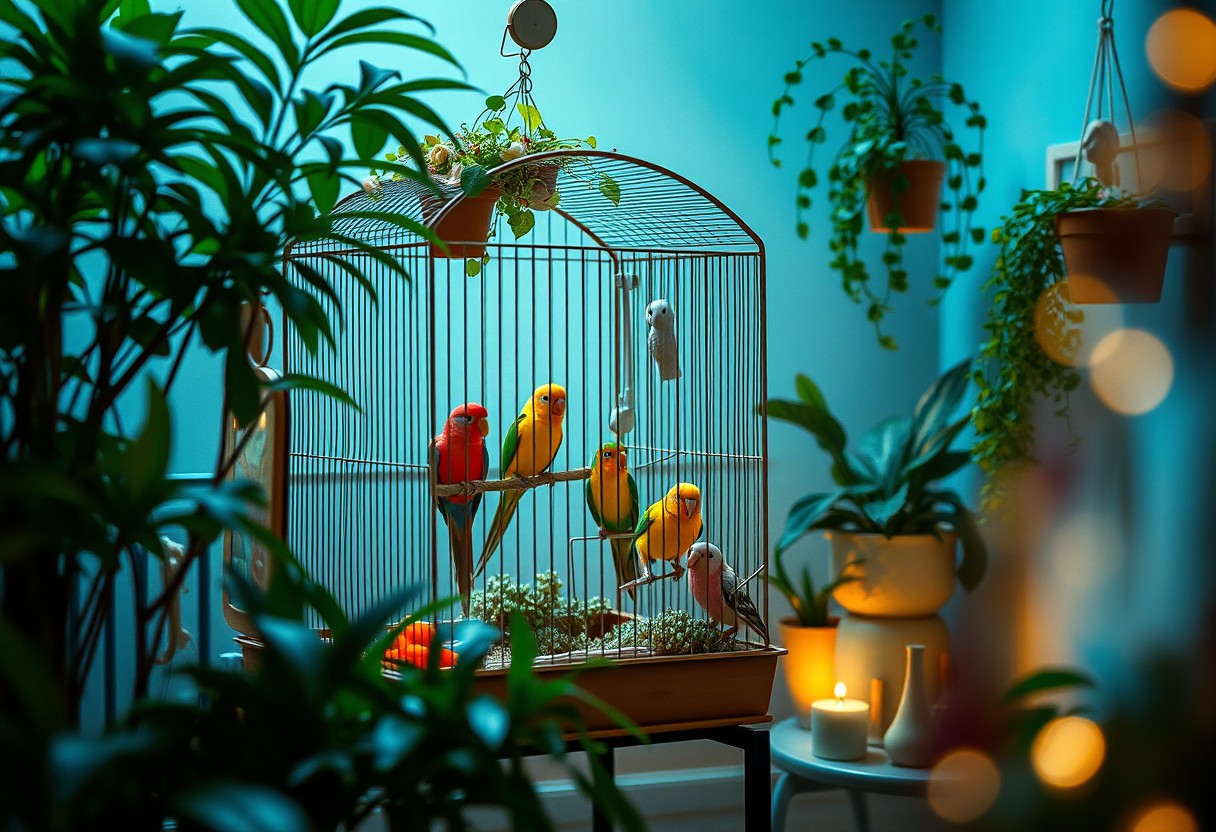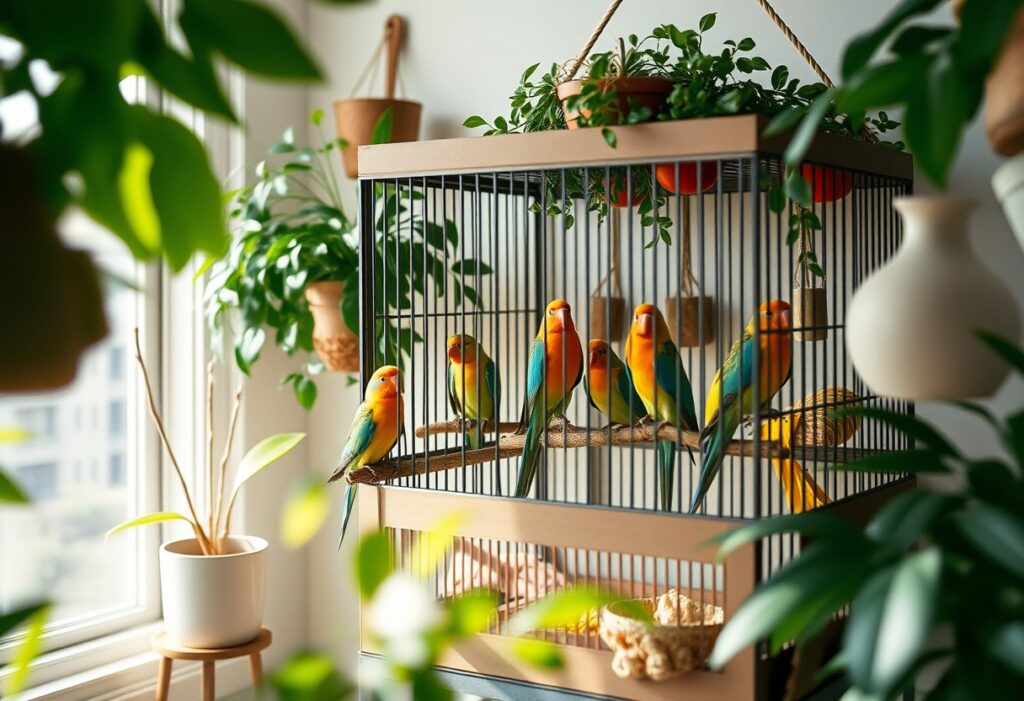Environment plays a crucial role in the well-being of your birds, as a stress-free setting significantly impacts their health and behavior. By reducing anxiety-triggering stimuli and providing a safe haven, you can ensure they lead happier and more fulfilling lives. A peaceful atmosphere not only enhances their social interactions but also promotes better immune function, leading to a longer lifespan. Understanding the necessarys of creating a serene space will greatly aid in maintaining your birds’ physical and emotional health, allowing them to thrive in your care.


Understanding Bird Behavior
Your understanding of bird behavior is crucial in creating a stress-free environment for your feathered friends. Birds, unlike many other pets, possess a range of complex behaviors that are deeply influenced by their natural habitat. By observing these behaviors, you can determine what elements contribute to their well-being and what stressors may hinder their happiness and health.
Natural Habitat and Stressors
To create the ideal home for your birds, it’s crucial to recognize their natural habitat and the various stressors present in that environment. Birds are typically found in diverse ecosystems, ranging from forests to wetlands, where they navigate through foliage, forage for food, and communicate with their flocks. In captivity, replicating these elements can alleviate stress that may result from isolation or lack of stimulation. Potential stressors, such as loud noises, sudden movements, or the presence of other pets, can significantly disrupt a bird’s sense of security.
To further mitigate stress, you should provide enrichment activities that mimic their natural behaviors, such as climbing, foraging, and socializing. This not only promotes mental engagement but also promotes the overall health and well-being of your birds. By understanding and mimicking their natural habitat, you empower your birds to thrive in a safe and welcoming environment.
Behavioral Indicators of Stress in Birds
One important aspect of understanding your birds is recognizing the behavioral indicators of stress. Birds may exhibit signs of stress through changes in their normal habits, such as decreased vocalization, feather plucking, or aggression toward cage mates. These behaviors suggest that your birds are feeling threatened or uncomfortable in their environment, and it’s vital to address these concerns promptly. Observing your birds will allow you to identify when something seems off, guiding you to potential solutions.
Understanding the nuances of stress indicators in bird behavior empowers you to take proactive measures in lessening their anxiety. With careful attention, you might notice signs such as tail bobbing, excessive preening, or a tucked head, which signal discomfort. By contrasting these behaviors with your birds’ typical actions, you can create a more stress-free living space that caters to their needs and enhances their overall quality of life.

The Impact of a Stress-Free Environment
If you are a bird owner or enthusiast, it is vital to understand the profound benefits that a stress-free environment can have on your feathered friends. Stress can manifest in various forms in birds, leading to behavioral issues and health complications. By creating a calm atmosphere, you not only enhance their well-being but also contribute to a more harmonious living space for both you and your pet.
Enhancing Physical Health
An necessary aspect of a stress-free environment is its capacity to enhance physical health in birds. When birds are free from stress, their bodies can function optimally, leading to improved immune responses and heightened vitality. Stress often exacerbates pre-existing health issues, making your pet more susceptible to diseases. By providing a space that minimizes anxiety, you enable your bird to flourish and maintain its physical strength.
An environment with minimal stress allows birds to maintain healthy digestive systems and reduces the likelihood of self-destructive behaviors, such as feather plucking. Ultimately, this contributes to a longer, healthier lifespan, providing you with many joyful moments together.
Promoting Positive Social Interactions
On the social front, a stress-free environment profoundly influences the way your birds interact with one another and with you. Birds are social creatures, and feelings of safety enable them to engage more meaningfully with their companions. A relaxed atmosphere fosters camaraderie and affection, helping to build stronger bonds between you and your pet, as well as among multiple birds.
To ensure positive social interactions, consider arranging habitats that allow birds to observe each other without feeling threatened. Providing enough space and resources can discourage territorial behaviors and promote cooperation and social learning within the flock. Ultimately, your birds will express themselves more freely, filling your home with delightful chirps and playful antics.
Fostering Natural Behaviors
Interactions in a stress-free environment encourage birds to display their natural behaviors. Without the hindrance of stress, birds exhibit instinctive actions like foraging, preening, and exploring their surroundings. You will notice that a relaxed atmosphere enables your pet to engage in activities that are crucial for their mental and physical health.
StressFree settings provide them with opportunities for enrichment and exploration. When birds feel secure, you will witness their playful side, with spontaneous flapping, singing, and climbing. Allowing your birds to express these natural behaviors enhances their overall quality of life and creates a more vibrant and dynamic household.
Creating a Stress-Free Environment
After recognizing the importance of a stress-free environment for your birds, the next crucial step is to create one. This involves focusing on several vital aspects that can enhance their overall well-being. A proper setting not only minimizes anxiety for your feathered friends but promotes desirable behavioral patterns and ultimately leads to a happier and healthier pet.
Ideal Housing Conditions
The first element of a stress-free environment is the ideal housing conditions. Your birds’ cages should be spacious enough to allow for comfortable movement, with the appropriate dimensions based on the size and species of your birds. The placement of the cage is also significant; placing it in a quiet area away from loud noises and heavy foot traffic will help your birds feel secure. It’s necessary to provide a safe and clean environment, where they can feel sheltered and protected from potential dangers.
Moreover, incorporating perches of various sizes and textures within the cage can provide your birds with opportunities to exercise their feet and explore their space. Ensuring that your birds have access to natural light is equally important; it helps regulate their circadian rhythms and contributes positively to their mood. With these elements in place, you create a nurturing habitat that minimizes stressors in your birds’ lives.
Importance of Socialization
On the other hand, socialization plays a pivotal role in creating a stress-free environment for your birds. Birds are inherently social creatures, and allowing them to interact—not just with their human caregivers but also with other birds—can significantly reduce anxiety and promote a sense of security. Regular social interaction helps birds develop necessary behaviors and reduces the likelihood of undesired habits that stem from isolation or boredom.
Moreover, fostering a supportive social environment allows your birds to feel more confident. Birds that engage socially tend to exhibit less aggressive behavior and show improved overall health. As you dedicate time for bonding and socialization, it is important to recognize each bird’s personality and respect their individual needs. This will ensure that your birds not only adapt well to your household but thrive in it.
Socialization is not just limited to interactions among birds; it also extends to how you interact with your feathered friends. Regularly spending quality time with your birds will help them feel more secure and less stressed. Talking to and handling your birds gently can foster a trusting relationship, encouraging them to feel safe and loved in their environment. This trust will go a long way in minimizing their stress levels.
Providing Enrichment and Stimulation
With a focus on providing enrichment and stimulation, you can significantly enhance your birds’ quality of life. Birds need mental and physical engagement to thrive. This can be achieved through varied toys, climbing structures, and foraging opportunities that captivate their attention and encourage natural behaviors. The more stimulating their environment, the less chance they will experience stress-related behaviors, like excessive screaming or feather plucking.
It’s also important to rotate toys and activities regularly to prevent boredom. Engaging your birds with new challenges keeps them mentally sharp and helps maintain their physical health. Be sure to observe how your birds interact with their toys, as this will provide valuable insights into what they enjoy and what keeps them stimulated.
Stimulation can complement your birds’ natural instincts and behaviors by mimicking their wild environment. Incorporating elements such as branches, swings, and even safe plants can create an enriching atmosphere that promotes exploration and exercise. Remember that a dynamic environment not only alleviates stress but also supports their mental wellbeing, giving them a fulfilling life as beloved companions in your home.
To wrap up
Drawing together the key insights on the benefits of a stress-free environment for birds, it’s clear that the quality of their living conditions significantly affects their health and behaviors. By creating a serene habitat for your feathered friends, you can help minimize stress-related issues such as feather plucking, reduced vocalization, or aggressive behaviors. A tranquil environment not only enhances their emotional well-being but also contributes to improved physical health, providing them with the energy and disposition needed to thrive in their daily lives.
Ultimately, fostering a stress-free environment for your birds is not just about making their immediate surroundings more pleasant; it is about investing in their long-term happiness and vitality. You hold the key to ensuring that they enjoy a fulfilling life, so take proactive steps in managing their habitat, reducing noise, and providing social interaction that suits their needs. By prioritizing their comfort and security, you create a nurturing space where your birds can flourish, leading to a more enriching companionship for both you and your avian friends.
FAQ
Q: How does a stress-free environment benefit birds’ health?
A: A stress-free environment significantly enhances birds’ overall health. When birds are kept in low-stress conditions, they exhibit reduced levels of the stress hormone cortisol. This can lead to a stronger immune system, improved feather quality, and a decrease in the risk of stress-related illnesses. Furthermore, birds in calm settings are more likely to engage in natural behaviors such as foraging, socializing, and exploring, which contribute to their physical and mental wellbeing.
Q: What are some common stressors in a bird’s environment, and how can they be minimized?
A: Common stressors for birds include loud noises, abrupt changes in their surroundings, lack of stimulation, and social conflicts with other birds. To minimize these stressors, it’s important to create a consistent routine, provide ample toys and enrichment opportunities, and choose a quiet location for their habitat. Additionally, ensuring proper socialization while monitoring interactions can prevent aggression and allow for a harmonious living environment.
Q: Can a stress-free environment impact a bird’s behavior, and if so, how?
A: Yes, a stress-free environment can have a profound impact on a bird’s behavior. Birds that live in serene settings are generally more sociable, playful, and confident. They are less likely to exhibit signs of anxiety such as feather plucking, excessive vocalization, or aggression. A calm atmosphere encourages birds to explore their surroundings, interact positively with their owners or companions, and engage in healthy, normal behaviors that enhance their quality of life.










